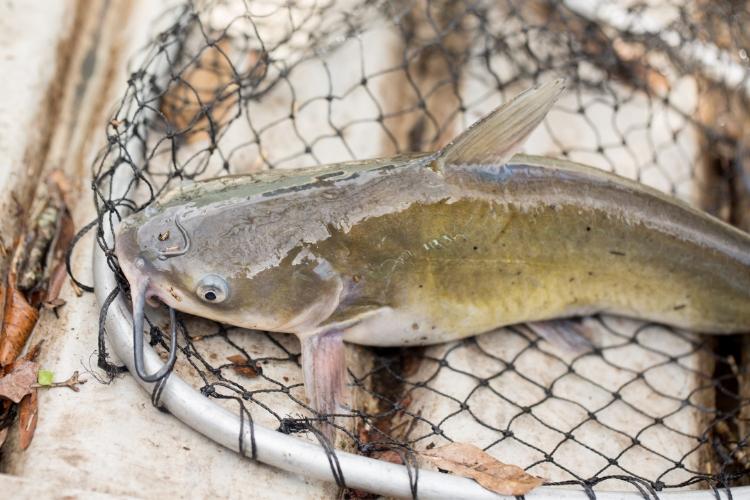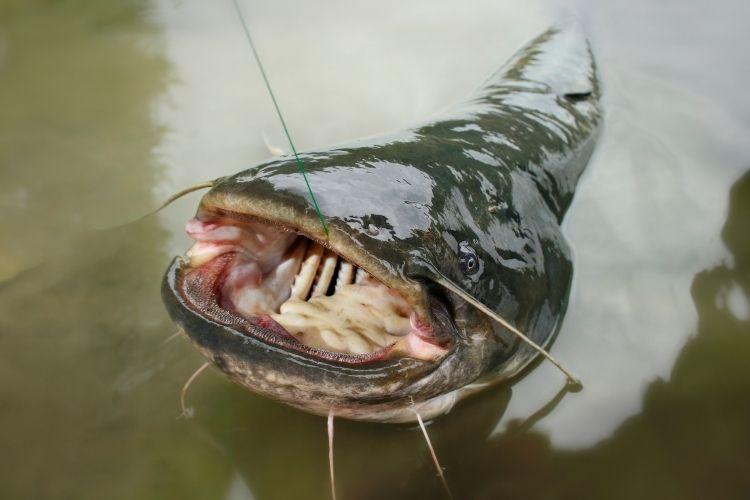Keeping your catch alive and well is very important.
If you practice catch and release, the fish has to be unharmed. If you plan to cook it, you want it to stay fresh as long as possible.
Some fish species are more resilient than other, and catfish are known for it. So, …
Here I am going to answer a few questions about this topic in the following chapters …
How Long Can Catfish Live out of Water?
As already mentioned, some catfish managed to live for 18 hours after they were taken out of their natural habitat – the water.
Some average life expectancy for catfish out of the water is a few hours, rarely more than three. This is actually a long time.
On average, fish die within 10 minutes. Some will die even sooner, while some can survive for days because they can get the oxygen they need through their skin.
I will tell you more about why do fish die out of water in the following chapters.
So, why can a catfish survive this long and what affects the ability of fish to stay alive for a few hours?
Catfish are known for their ability to survive in low oxygenated waters and can withstand such conditions.
Species like trout, that live in well oxygenated, fresh and clear waters are those who die within minutes when you take them out.
Fish that have slow metabolism and are caught in very cold waters can also survive quite long, because their need for oxygen is reduced. One example for this is pike caught during ice fishing.
The same fish will die faster in warmer months when the metabolism is working fast and the fish is actively feeding.
I mentioned all the other species to give you an idea why a few hours are actually excellent and what is it influenced with.
How long can catfish survive out of water and their ability to live out of the water is also influenced by outside factors, such as sun exposure, air temperature and humidity level.
Of course, you can’t expect it to live very long on a hot, dry, sunny day with no cover.

One More Interesting Fact About Walking Catfish
There is a catfish specie called walking catfish, and it is known for its ability to spend time on dry land.
It normally lives in hypoxic and muddy waters, however it can “walk” (or wiggle by using pectoral fins) from one pond to another, if the first one dries out.
This catfish can absorb oxygen through skin. Of course, it can’t live forever like this, but it can last for hours.

How do you Keep Catfish Alive After Catching Them?
Keeping the catfish alive and well is extremely important if you are practicing catch and release. Fish must be kept unharmed.
You should keep it out of the water for the shortest possible time period.
Just enough to safely unhook it and take a picture. Make sure you do not injure a fish when removing the hook, and use hooks that are suitable for this purpose.
First of all, use a net to get the fish out of the water, and put it safely on the unhooking mat. After you removed the hook, gently hold the fish if you want to take a picture and release it to the water again. Don’t handle the fish roughly or throw it back into the water.
Sometimes, anglers are forced to keep the fish alive, and can’t release it immediately.
During some tournaments, fish has to be alive for the weigh in, and anglers release it afterwards. There is no point of releasing a fish that won’t be able to survive due to irreversible damage.
If you have to keep it for a longer period of time, invest in a good and spacious live well. Some models even have aerators to provide enough oxygen. If you are using those, keep an eye on a water temperature and don’t let it increase too much. Clean it after every use and your catfish is going to survive and be in good health so that you can safely release it.
You can add a bit of ice into the live well to lower the temperature if necessary, but do it slowly and do not cool it down too much.
It can be a shock for the fish when the temperature suddenly drops. The same shock can happen when you release it to warmer water again.

Why Does a Catfish Die When Removed from Water?
Now you know how long can catfish live out of water, and how to increase its lifespan, but …
Why does a catfish die when removed from water?
Fish, including catfish, use their gills to get the oxygen from water. It is their way of breathing. Some fish may intake oxygen through their skin, but gills are their primary breathing organ. Due to their anatomy and biology, fish can’t use their gills to get the atmospheric oxygen from air. When you remove them from the water, fish will suffocate and die.
The same happens to mammals when under water due to respiratory systems devoleped to breathe air …
Even fish species who are able to intake certain amount of oxygen through their skin will die when out of the water, although they will live longer.
Fish evolved to live their entire lives underwater. Their skin lacks the same protective layers as land animals have, their eyes are not adapted to land life, and their fragile gills also suffer a significant damage when not in water.
Even if the fish don’t suffocate, it will die.
Fish can actually suffocate in the water too. If the water is not oxygenated enough, fish will die.
Of course, catfish can live in waters with extremely low oxygen level, but they still need some.
Some fish species, including African sharp toothed catfish, can survive in puddles of mud, waiting for rain and water to arrive, however those species developed certain adaptations and extra organ to do so.
And their body stays protected by wet mud, and their mucus and slime. In addition to that they have a form of primitive special organ that helps oxygen intake from air called the suprabranchial organ. Of course this is not the one of the primary air-breathing organs like gilly and it is only an »accesory«.
During this “dormant” state, their metabolism slows down and they can get a bit of oxygen from outside, which is enough to survive.

How do Catfish Survive in the Mud / Dirty / Low Oxygen Conditions?
Catfish are able to survive in mud and dirty water due to their unique physiological adaptations.
Their barbels, or whisker-like organs, are equipped with taste buds that allow them to easily detect food in murky waters. In addition to scavenging for detritus and small organisms in the mud, catfish can also adapt their diet to include insects, small fish, and even aquatic plants.
They have a highly efficient digestive system that enables them to quickly process and extract nutrients from their food, making them well-suited for survival in low-oxygen environments.
Additionally, their skin is coated with a layer of mucus that protects them from parasites and bacteria found in dirty water.
All these adaptations allow catfish to thrive in environments that may be challenging for other fish species, making them well-adapted for living in muddy or polluted waters.
Will you Cook the Catfish? How to Keep it Fresh For Cooking?
Knowing for how long can catfish live out of water is important for cooking process.
Catfish is very tasty and healthy, and same as other fish species, it is the best when fresh.
There are a few ways to keep it like that, depending on how long does it take you to get home with it.
If you can, keep the catfish alive after you catch it for as long as possible.
Live wells are useful for this purpose; however, a bucket of water can be enough for a shorter period of time. Make sure that you change the water when it starts to get warm and low on oxygen.
After you bring it home, you can kill the fish (do not torture it in a way to clean it alive) and cook it, or you can increase its lifespan a bit more by placing it into a larger space.
Some anglers even use bathtubs for this purpose.
If you can’t keep the fish alive in water, you should place it on ice, or in the fridge. It is always useful to have a small, portable, fridge with you while fishing.
If the fish is not alive, it is important to keep it as cold as possible and cook it as soon as possible. By doing so, it will not spoil, and you will enjoy the fresh taste.
Sometimes, anglers can’t eat the fish right away and they decide to store it for a longer time period. In that case, place it into the freezer, but be aware of the fact that frozen fish is never as good as the fresh one when cooked.
Conclusion
Knowing how long can catfish live out of water is important for several reasons. You have to be aware of factors that influence this time when you are practicing catch and release.
Those who want to enjoy one for lunch can use this info to keep it fresh.
When taking all of this into consideration, we can conclude that catfish are very resilient and some species even adapted to life with almost no water surrounding them.

